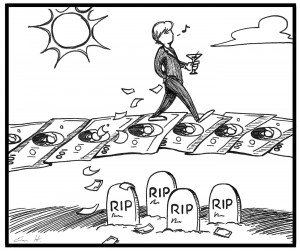
They say money can’t buy happiness, but even that is debatable if someone is swimming in wealth and happens to find himself in trouble with the law.
Picture it: a North Texas teen killed four pedestrians and injured several others in June as a result of drunken driving. He was sentenced to 10 years’ probation.
Why was he given a sentence that basically amounts to a slap on the wrist?
His attorneys successfully argued that the teen was a victim of “affluenza” and thus had never learned right from wrong from his parents because he was raised under the notion that money would always buy him out of trouble.
This isn’t the first time the teenager has found himself in trouble with the law, either. According to NBC News, he had received two citations a few months before: one for possessing alcohol and another for consuming it, both as a minor. His sentencing included probation as well as a mandatory alcohol awareness class and 12 hours of community service.
It just goes to show how much good that punishment evidently did him.
It is interesting to note the same judge who sentenced this teenager did not show as much lenience last year when she sentenced a 14-year-old African-American to 10 years in prison after he punched a man, which caused his death.
Could there be some underlying racial and class bias in the discrepancies regarding these sentences?
Another point of concern this issue raises is that if this teenager can get away with arguing that he shouldn’t be harshly sentenced because he wasn’t raised right, how many other juveniles eventually could use the same argument?
If going in front of a judge and testifying, “It’s not my fault! My parents didn’t raise me right!” will be enough to get a light sentence, then there probably wouldn’t be anybody left in the juvenile detention system.
And even if this young man did not get a proper upbringing from his parents, he surely has had plenty of opportunities to be taught right from wrong from other relatives, peers, teachers and countless other members of the community.
It should be noted that affluenza is not recognized as a legitimate psychiatric condition. Rather, it is a term coined to describe “a dysfunctional relationship with money/wealth, or the pursuit of it,” according to the website theaffluenzaproject.com. One of its symptoms is a false sense of entitlement.
In the end, one wonders whether or not this young man will ever correct his ways if he continues to be coddled by the justice system.
Lawyers said he would always do whatever he pleased because he knew his wealth exempted him from suffering the consequences of his actions.
And that, unfortunately, has held true.


























